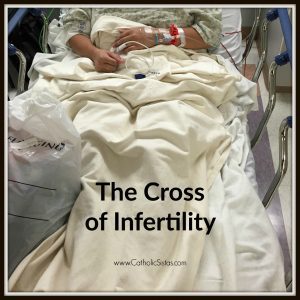
“So, when are you going to have kids?”
It’s one of the most awkward questions I encounter and one of the most stressful, frustrating, and tear-inducing. It’s a question asked by well-meaning and caring relatives, friends that don’t know any better, friendly parishioners I know and by nosy busy-body parishioners I don’t know. And while I’m pretty good at hiding and dealing with my emotions, I still don’t know what to say to people when they ask that question, even after 6 ½ years of marriage.
Why?
Because my husband and I are in the midst of infertility struggles. Somehow, fertility struggles such as miscarriage and infertility are on the list of “taboo topics” to discuss openly and honestly within our Catholic faith and in society at-large. Plus, many times honest responses are full of emotion, making the topic difficult to talk about.
In a faith that values the preciousness and sanctity of every human life, a faith that rejoices and celebrates in the creation of new life, a faith that encourages procreation of new little souls with God, there’s not too much said if there are difficulties in getting pregnant or maintaining a pregnancy. People don’t know what to do (or not to do), or what to say (or not to say), to someone in these situations. Fertility and infertility are extremely personal. And for most, extremely private. And yet infertility and fertility problems are much more common than we often realize. There’s a good chance you know several people struggling with them.
What is Infertility?
Infertility is typically defined as the inability to conceive within one year, or not being able to carry a child to live birth. Woman who are able to get pregnant, but have miscarriages, are also considered to be infertile. Infertility can come in two ways: Primary, which is when you haven’t been able to have any children; and secondary, which is when you have been able to have at least one child.
Infertility is often a silent, lonely, stressful, frustrating and tear-inducing cross. It can be an agonizing cross to couples who long to have children, and especially to those that have always wanted a large family like my husband and me. It can be a doubly-difficult cross when you’re Catholic, as having children is a typical expectation within the faith community. As with all crosses, it can be a positive experience or a negative experience. And most often, it’s a little bit of both. It is a cross that many woman AND men carry:
- Infertility is a disease that results in the abnormal functioning of the male or female reproductive system.
- Infertility is defined as the inability to conceive after one year of unprotected intercourse (or 6 months if a women is over the age of 35) and/or the inability to carry a pregnancy to live birth.
- 1 in 8 couples (or 12% of married women) have trouble getting pregnant or sustaining a pregnancy (so there’s a good chance you know multiple people struggling to have children).
- Infertility is not always a woman’s problem. Both women and men can have problems that cause infertility. About 1/3 of fertility issues are a result of a women’s problem, 1/3 of fertility issues are a result of a man’s problems and the other 1/3 are caused by a mixture of male and female issues or cannot be explained medically.
- Approximately 44% of women with infertility seek medical assistance. Of those, 65% give birth. (The birthrate numbers are higher with NaProTechnology, but NaProTechnology can’t resolves all medical issues or unexplained infertility.)
Information from Resolve.org
 The Cross of Infertility
The Cross of Infertility
Much of the time in dealing with the cross of infertility, I have been blessed to have a spirit of joy, patience, peace and trust in God’s plan. But it would be misleading of me not to admit that at times I struggle to have hope, to have joy, to have patience, to have peace and to have trust in God’s plan through this process and with this cross. There have been priests who have scolded me for confessing my frustrations with God; friends who have off-handedly mentioned they forget to invite my husband and I to hang out because we don’t have kids for their kids to play with. There have been acquaintances who have asked extremely personal questions, family members who have offered to be surrogates, and there have been numerous doctors appointments, blood work appointments, medications, surgeries and dietary changes.
The cross of infertility can be stressful, frustrating and painful. It can be emotionally, mentally, socially and spiritually draining; and yet it is a cross given from Christ not as punishment but with a purpose. It is an opportunity to unite to Christ on the cross. I have had the joy (and yes, I do mean joy) of offering up the difficulties, the pain, the frustrations, the emotions and more to God for many purposes and people throughout these past few years. No, it doesn’t take away the pain and difficulty, but it does provide a purpose for the cross.
– – – – – – – – – – – –
If you or someone you know is dealing with infertility, the Catholic medical group Pope Paul VI Institute has done extensive research and work in the field of fertility and infertility resulting in NaProTechnology (Natural Procreative Technology).
